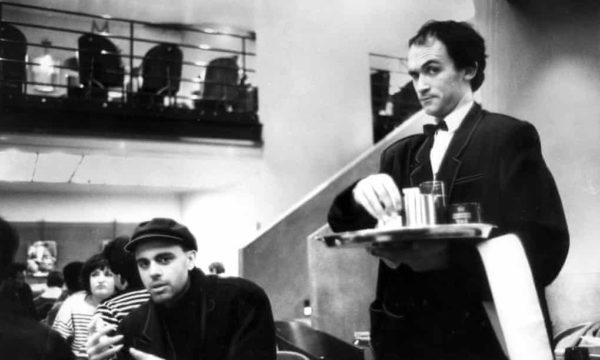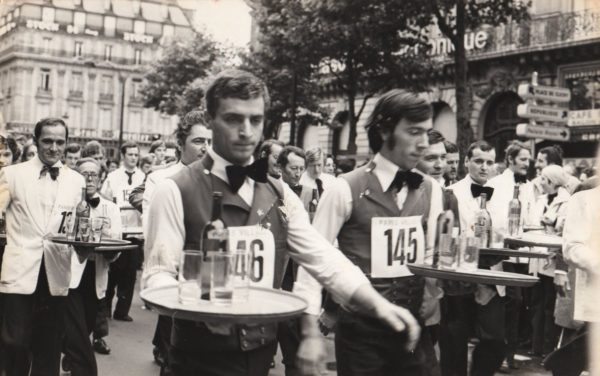So many restaurant meals begin like this: You’ve barely even glanced at the cocktail menu before an anxious server approaches the table and asks if you have any questions.
“Could you give us a minute?”
“Sure, sure… take your time.”
Moments later, before you’ve even had a chance to open the menu, a suited staff member, presumably a sommelier or manager, asks if you’d like to order drinks or have any questions about the wine list. Fearing another intrusion, you obligingly order drinks.
After the waiter delivers the cocktails, he recites the specials and asks if you need any help or if you’re ready to order. You haven’t even had a sip of your drink and he’s already badgering you into making menu decisions.
“Sorry, we haven’t looked yet,” you say, summoning as much compassion as you can muster without showing you’re annoyed by his pestering.
“I’m so sorry,” the waiter apologizes nervously, “I’ll can give you some more time.” He stands uncomfortably close to the table glaring at you and pounces like a bobcat the moment you put down your menus.
This scene probably sounds hauntingly familiar to anyone who dines out a lot. As the industry struggles to combat shrinking margins by increasing cover counts, restaurant meals are getting shorter. Input costs—food, labor, rents—are skyrocketing and raising prices is always a last resort.
The only way for many restaurants to protect their profits in today’s challenging economy is to go faster. Allowing guests to dictate the pace of their meals is a luxury of yesteryear and most casual places can’t afford to relinquish the steering wheel anymore.
Even in the busiest restaurants, management has had to find creative ways to minimize turn times. Waitstaff are browbeaten nightly prior to their shifts about the urgent need to expedite table turns. In popular restaurants, the need to turn tables is often emphasized over the basic tenets of hospitality. Excellence is still expected, it’s just expected faster.
Maitre’ds, who are responsible for seating everyone punctually, have become merciless toward incomplete parties and tardy guests. If they seat latecomers or an incomplete party, there will be likely be rigid conditions attached for returning the table at a particular time.

Busy restaurants often aggressively over-book to account for no-shows and last minute cancellations. Many parties with prime time reservations will be given earlier slots even though the restaurant knows it’s unlikely they’ll be seated on time.
Getting more people through the door often requires making false promises. It also necessitates swiftly turning, if not flat out rushing, the first tranche of tables to seat the second and third wave of reservations on time. Talk to any restaurant manager about their priorities and, if they’re being honest, almost everyone will admit it’s turning tables.
As a result, hospitality norms have eroded out of necessity. Our primary focus used to be on making you happy, now we’re focused on making you happy in a shorter period of time. If you’re eating slowly, the kitchen may send your main courses before the appetizers have been cleared. Busboys are more likely to hover like vultures around your table, looking to clear your plates at the precise moment you take your last bite.
There’s a good chance the check will arrive without your asking. Didn’t that used to be rude? Once taboo, managers have also become less gun shy about asking lingering parties to vacate (though they will usually extend an olive branch, like buying everyone drinks at the bar).
If you choose to abuse the power to stay as long as you like, there may be consequences. Developing a reputation for habitually lingering (we call it “camping”) may negatively influence your ability to make reservations in the future. Most restaurants with computerized reservation systems have notes on your profile where they log your tendencies.
Of course the restaurant values your business, but it just doesn’t value yours as much as a guest who also respects the parameters of a normal table turn. People always like to think restaurants are democracies, but they are not. Restaurants are meritocracies. Because they are private businesses, favoritism may exist when it protects the bottom line.
All restaurants make an effort to treat every guest equally. But, as a guest, you have endless opportunities to distinguish yourself. The more loyalty you show to a restaurant, for example, the more leeway you’ll be given for dictating the pace of your meal. Extending that courtesy to everyone can be crippling to revenue and upsetting to other guests who are seated late because of it.
Rather than making demands about slowing down your restaurant meals or holding the table hostage, make an effort to work within the restaurant’s parameters. Showing awareness of the need to return the table is guaranteed to make the staff more gracious toward you. If you’re finished your meal but don’t want to leave, politely ask someone if they could find space for you at the bar for after dinner drinks.
Whether you like it or not, the best catalyst for enthusiastic service is always spending more money. Once you stop buying things in a restaurant, your entitlement to occupying the table expires. Management always does it’s best to extend courtesy to everyone dining to give them as much time as possible to enjoy their experience but, like everything, there are limits.
Restaurants serve as communal spaces, but the seat you’ve procured doesn’t belong to you. Staying seated in it for a long time is a privilege not a right, and, as the restaurant industry struggles to serve our communities, we ought to respect that more. Otherwise, our favorite restaurants may start disappearing sooner than we think.

